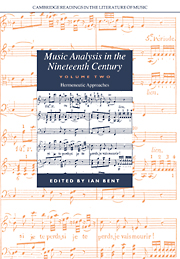Book contents
- Front matter
- Contents
- Preface to volumes I and II
- List of abbreviations
- General introduction
- Part I: Elucidatory analysis
- Introduction
- Analysis 1 Hector Berlioz (1803–1869)
- Analysis 2 Richard Wagner (1813–1883)
- Analysis 3 Wilhelm von Lenz (1809–1883)
- Analysis 4 Ernst von Elterlein [Ernst Gottschald] (1826-?)
- Analysis 5 Julius August Philipp Spitta (1841–1894)
- Analysis 6 Hans von Wolzogen (1848–1938)
- Analysis 7 Hermann Kretzschmar (1848–1924)
- Part II: Objective–subjective analysis: the hermeneutic circle
- Afterword to volumes I and II
- Bibliographical essay
- Index to Volumes I and II
Analysis 6 - Hans von Wolzogen (1848–1938)
‘Parsifal’: ein thematischer Leitfaden durch Dichtung und Musik (1882)
Published online by Cambridge University Press: 10 December 2009
- Front matter
- Contents
- Preface to volumes I and II
- List of abbreviations
- General introduction
- Part I: Elucidatory analysis
- Introduction
- Analysis 1 Hector Berlioz (1803–1869)
- Analysis 2 Richard Wagner (1813–1883)
- Analysis 3 Wilhelm von Lenz (1809–1883)
- Analysis 4 Ernst von Elterlein [Ernst Gottschald] (1826-?)
- Analysis 5 Julius August Philipp Spitta (1841–1894)
- Analysis 6 Hans von Wolzogen (1848–1938)
- Analysis 7 Hermann Kretzschmar (1848–1924)
- Part II: Objective–subjective analysis: the hermeneutic circle
- Afterword to volumes I and II
- Bibliographical essay
- Index to Volumes I and II
Summary
Act I Scene I of Parsifal is an extraordinarily sophisticated dramatic construction, more than half taken up with narrative – a narrative that is highly complex. Von Wolzogen divides the scene into two unequal parts at precisely the beginning of that narrative (b. 281), perceiving the two parts as opposites: action|repose, or incident|narration, or drama|epic.
His awareness of this polarity is shown in a particularly acute way. Briefly, Gurnemanz's narration proceeds in six sequences, each one responding to remarks or questions by the squires, and each concluding in the ‘now’ of the narrative. The time of the story is narrated non-linearly, and it is not until the beginning of the fifth sequence that we reach the earliest point of the story (Titurel; the forces of evil). The fifth therefore (and perversely von Wolzogen decrees that the ‘narrative proper’ does not begin until this point) traverses all the other sequences – save, that is, for one startling moment, at b. 575, when Gurnemanz introduces an ellipsis – an overt gap in the narrative:
Amfortas strove unceasingly
To put a stop to the sorcerous scourge;
– You know how that worked out:
Line 3 refers listeners to their own reserves of memory, derived from previous narrative sequences. However, in the fragment of time between lines 2 and 3, the music tosses them a clue: a tiny, jerky figure, unison in strings.
- Type
- Chapter
- Information
- Music Analysis in the Nineteenth Century , pp. 88 - 105Publisher: Cambridge University PressPrint publication year: 1994



